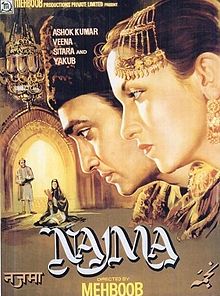- Muslim social
-
The Muslim social is a genre of film in Hindi cinema that portrays and critiques Islamic culture in India. Muslim socials are divided into two categories: "classic Muslim socials" that explore nawabi culture and focus on upper class or elite Muslim families, and "new wave Muslim socials" that portray middle class Muslim families who experience economic problems, discrimination and communal violence.[1] Muslim socials often include ghazals and qawwalis, musical forms commonly associated with Islamic culture.[2]
The earliest Muslim socials were made in the 1930s after the advent of sound and continued to be popular until the 1980s. The genre's popularity was partly due to the financial success of Mehboob Khan's Najma which became the blueprint for Muslim socials that followed.[3]
Classic Muslim socials
- Pukar (1939)
- Qaidi (1940)
- Najma (1943)
- Elaan (1947)
- Chaudhvin Ka Chand (1960)
- Mere Mehboob (1963)
- Benazir (1964)
- Gazal (1964)
- Palki (1967)
- Bahu Begum (1967)
- Mere Huzoor (1968)
- Mehboob Ki Mehndi (1971)
- Pakeezah (1972)[4]
- Naseem (1995)
New wave Muslim socials
- Dastak (1970)
- Garm Hava (1973)
- Bazaar (1982)
- Nikaah (1982)
- Salim Langde Pe Mat Ro (1989)
- Mammo (1994)
- Sardari Begum (1996)
- Fiza (2000)
References
- ^ Allen, Richard; Ira Bhaskar (2009). Islamicate Cultures of Bombay Cinema. Tulika Books. pp. 91–92. ISBN 9788189487539.
- ^ Babb, Lawrence A.; Susan S. Wadley (1998). Media and the Transformation of Religion in South Asia. Motilal Banarsidass. p. 151. ISBN 8120814533. http://books.google.com/books?id=cgDHFFe7YM8C&pg=PA151&dq. Retrieved 17 March 2010.
- ^ Dönmez-Colin, Gönül (2004). Women, Islam and cinema. London: Reaktion Books. p. 93. ISBN 1861892209. http://books.google.com/books?id=pWhZ0hgH80cC&printsec=frontcover. Retrieved 17 March 2010.
- ^ Gulzar; Govind Nihalani, Saibal Chatterjee (2003). Encyclopaedia of Hindi cinema. Popular Prakashan. p. 241. ISBN 8179910660. http://books.google.com/books?id=8y8vN9A14nkC&pg=PT265&dq. Retrieved 17 March 2010.
Categories:- Film genres
- Indian film-related lists
Wikimedia Foundation. 2010.

